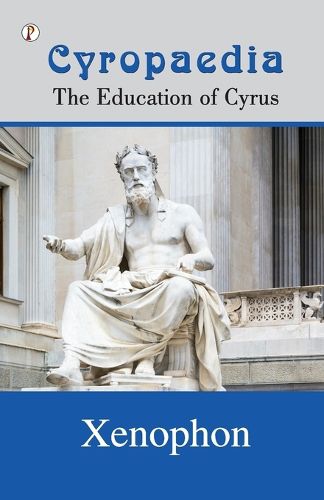Readings Newsletter
Become a Readings Member to make your shopping experience even easier.
Sign in or sign up for free!
You’re not far away from qualifying for FREE standard shipping within Australia
You’ve qualified for FREE standard shipping within Australia
The cart is loading…






This title is printed to order. This book may have been self-published. If so, we cannot guarantee the quality of the content. In the main most books will have gone through the editing process however some may not. We therefore suggest that you be aware of this before ordering this book. If in doubt check either the author or publisher’s details as we are unable to accept any returns unless they are faulty. Please contact us if you have any questions.
Written by the ancient Greek historian and philosopher Xenophon, Cyropaedia: The Education of Cyrus is a timeless exploration of leadership, virtue, and the art of ruling. Often regarded as one of the earliest works of political philosophy, this epic tale follows the life and education of Cyrus the Great, the founder of the Persian Empire, and offers a captivating portrayal of his rise to power, his leadership qualities, and the principles that guided him in building one of history's most expansive empires. In this work, Xenophon weaves a narrative of Cyrus's education from a young age, focusing on his moral, intellectual, and military development. Through the mentorship of wise figures and his own natural abilities, Cyrus learns not just the practical skills of ruling, but also the deeper virtues of compassion, justice, and the importance of inspiring loyalty in his subjects. Cyropaedia explores the idea of a ruler who governs not by fear or oppression but through wisdom, understanding, and a sense of responsibility toward his people. More than just the biography of a historical figure, Cyropaedia serves as a guide to leadership, providing timeless lessons on governance, strategy, and the cultivation of personal character. With its rich narrative and philosophical depth, this work remains a vital source of insight for anyone interested in the art of leadership, ancient history, or the complexities of human nature.
$9.00 standard shipping within Australia
FREE standard shipping within Australia for orders over $100.00
Express & International shipping calculated at checkout
Stock availability can be subject to change without notice. We recommend calling the shop or contacting our online team to check availability of low stock items. Please see our Shopping Online page for more details.
This title is printed to order. This book may have been self-published. If so, we cannot guarantee the quality of the content. In the main most books will have gone through the editing process however some may not. We therefore suggest that you be aware of this before ordering this book. If in doubt check either the author or publisher’s details as we are unable to accept any returns unless they are faulty. Please contact us if you have any questions.
Written by the ancient Greek historian and philosopher Xenophon, Cyropaedia: The Education of Cyrus is a timeless exploration of leadership, virtue, and the art of ruling. Often regarded as one of the earliest works of political philosophy, this epic tale follows the life and education of Cyrus the Great, the founder of the Persian Empire, and offers a captivating portrayal of his rise to power, his leadership qualities, and the principles that guided him in building one of history's most expansive empires. In this work, Xenophon weaves a narrative of Cyrus's education from a young age, focusing on his moral, intellectual, and military development. Through the mentorship of wise figures and his own natural abilities, Cyrus learns not just the practical skills of ruling, but also the deeper virtues of compassion, justice, and the importance of inspiring loyalty in his subjects. Cyropaedia explores the idea of a ruler who governs not by fear or oppression but through wisdom, understanding, and a sense of responsibility toward his people. More than just the biography of a historical figure, Cyropaedia serves as a guide to leadership, providing timeless lessons on governance, strategy, and the cultivation of personal character. With its rich narrative and philosophical depth, this work remains a vital source of insight for anyone interested in the art of leadership, ancient history, or the complexities of human nature.